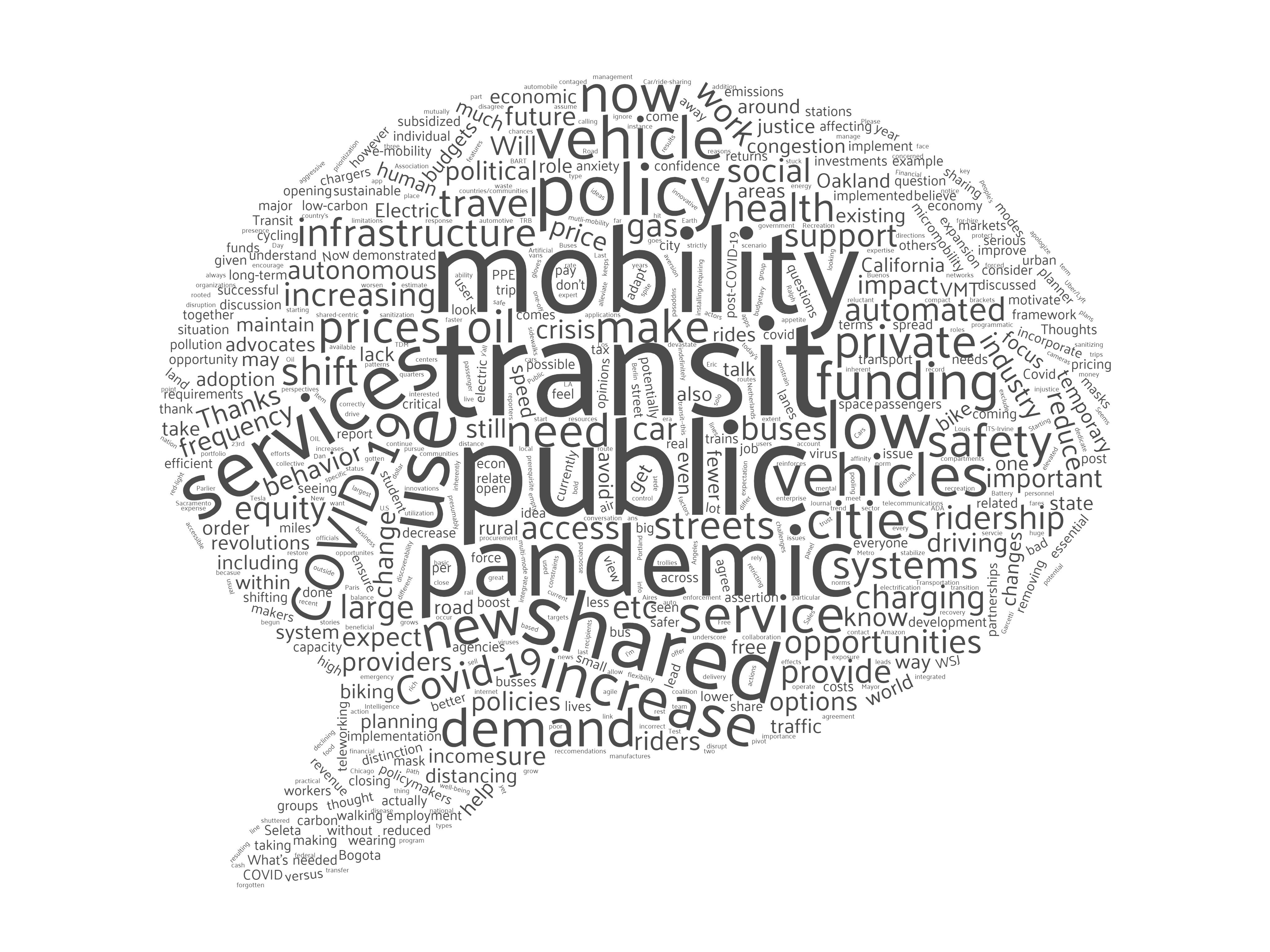Event Date
Watch the Webinar Recording Here
Participants
• Dan Sperling, Founding Director, ITS-Davis; Distinguished Blue Planet Prize Professor of Civil and Environmental Engineering, and Environmental Science
• Susan A. Shaheen, Director, Resilience and Innovative Mobility, UC ITS; Professor, Civil and Environmental Engineering, UC Berkeley; Co-Director, Transportation Sustainability Research Center, UC Berkeley (View presentation slides)
• Seleta Reynolds, General Manager, Los Angeles Department of Transportation
Event Summary
On Monday, April 27, 2020, the 3 Revolutions Policy Initiative kicked off a Webinar series with a discussion on how Covid-19 is changing transportation worldwide. Nearly 800 people logged-on from 21 countries to listen as Dr. Dan Sperling, founder and Director of ITS-Davis, moderate a discussion with panelists Dr. Susan Shaheen, Director of Resilient and Innovative Mobility Initiative, UC ITS and Seleta Reynolds, General Manager of the Los Angeles Department of Transportation.
These experts discussed the rapidly changing transportation environment resulting from the Covid-19 pandemic and debated how changes in travel behaviors may persist beyond stay-at-home orders. They also addressed how policymakers could best approach social distancing and the disruption of public transit.
Sperling launched the webinar with a brief history of the three revolutions in transportation—electrification, shared mobility, and automation—and how the current pandemic has affected the public’s attitudes toward sharing of cars, buses, and planes, and asked whether this reluctance to share space is likely to persist and what that might mean for the future of transit and car ownership. Throughout the webinar, he highlighted the role of public policy to reinforce “good” trends and mitigate “bad” trends in transportation. Sperling further noted the importance of looking at transit systems from a user perspective, and tailoring them to users’ needs.

In her remarks, Shaheen voiced concerns about social equity during the pandemic. Both traditional public transit and shared mobility (like ridehailing, microtransit, and micromobility access) are limited by new restrictions. Shaheen noted the crucial relationship between jobs, food access, and transportation. She warned that limited mobility could exacerbate poverty and homelessness. She also suggested that policy makers need to carefully consider how to best assist those who have recently lost their jobs and access to mobility. While the overall trend of reduced vehicle miles traveled during the pandemic has dramatically improved air quality, Shaheen expressed concerns that a reduction of gas tax revenues could delay future road-work and infrastructure plans.
As General Manager of the Los Angeles Department of Transportation, Reynolds shared insight into how Los Angeles is meeting transportation challenges in response to Covid-19. She agreed with Shaheen that public transit inadequacies can cause hardships for people who need to travel to work and long distances due to spatial mismatch between home and work locations. Reynolds shared data about public transit changes in Los Angeles: overall vehicle traffic is down 40-50%, but driving speeds are up 12-30%. With fewer cars on the roads, Los Angeles traffic deaths are down 22%. Meanwhile, bike riding is only down about 13%, but bus ridership is down about 75%. ‘Life-line’ bus services are providing essential mobility for front-line and healthcare workers.
Despite the reduction in travel in Los Angeles, traffic officers and crossing guards are spending almost double the amount of time directing traffic at food pantry sites and testing centers due to increased demand for these services. Reynolds mentioned several new initiatives to help Angelinos combat the pandemic. The Department of Transportation has busses on loan to the Los Angeles Fire Department to provide mobile testing centers for people living outside. Meal delivery services for older adults are also rolling out. She also expressed concern for the experiences of at-risk populations, like elderly sign shop workers who cannot work on site.
Attendees of the webinar posed about 100 questions. With limited time, the panelists focused on questions related to public transit, avoiding a possible surge in single-occupant vehicle travel, and the role of micromobility, including e-scooters and bikesharing programs.
Each panelist, including Sperling, advocated for innovation and change to the transportation sector in response to Covid-19. Shaheen described the current situation as a time for policymakers and researchers to “be bold” and to allocate the $25 billion of federal relief funds for public transit agencies that provides flexibility and a “people- and context-sensitive” response. She suggested making public transit free or highly subsidizing it for vulnerable populations, along with adding more late-night transportation services. Reynolds also advocated for boldness, saying “professionals in the transportation industry need to change or revise their agenda and realize it’s time to have a different approach to public transit.”
Future public transit changes suggested by Reynolds include more protective bike and bus-only lanes. Due to well-documented traffic issues in Los Angeles, she also said that the City needs to make sure auto-ownership is ‘disentangled’ from auto-access while the city works to increase the number of electric vehicles available, implying a need for additional carsharing and rental programs. Reynolds also envisioned a future in which each person in Los Angeles could have a virtual ‘mobility wallet’ that would afford them basic transportation funds.
Despite the clear need for innovation and change in public transit, Reynolds also cautioned that government agencies should take thoughtful actions. Listening to community voices will mean agencies can avoid a “heavy handed” approach when planning and building transportation infrastructure. Shaheen echoed the importance of equitable strategies, such as a mobility wallet, to extend access to transportation and to provide travelers with transparency about their transportation choices, travel times, and costs. Both Shaheen and Sperling mentioned a growth in telecommuting as one potential way to counteract a reactive surge in single-occupant vehicles.
The panelists raised many important and nuanced points during this presentation and the full webinar can be viewed here. These discussions will continue during the ongoing 3 Revolutions Policy Initiative Webinar Series.
